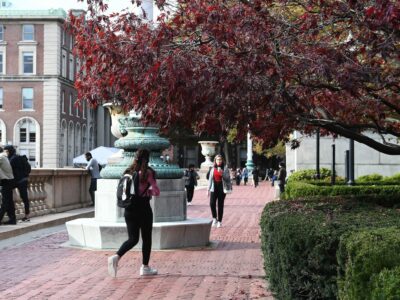
Columbia Climate School staff and Earth Institute alumni make up a large part of the M.S. in Sustainability Management program faculty base, so it’s no wonder that Martinez is co-teaching the Earth Institute Practicum this fall.
What initially motivated you to pursue the field of sustainability?
I have always been passionate about environmental issues and was particularly interested in looking at these issues through a health lens, which is what drew me to study environmental health policy at the Mailman School of Public Health. Public health — like the fields of sustainability and climate — is inherently interdisciplinary and involves complex topics that impact society in critical ways. The MPH program was crucial in giving me a better understanding of the linkages between health, the environment and sustainability, and how policy could address such interdisciplinary challenges.
What drew you to the Columbia Climate School and the School of Professional Studies?
My first exposure to the Earth Institute came when I was a graduate student at Mailman. Back then (before the Climate School was formed), the institute had a student body committee made up of representatives from each of Columbia’s different schools and I was the public health representative. That was my first exposure to the Earth Institute’s research, and how I learned about the amazing scientific activity happening at places like the Lamont-Doherty Earth Observatory. Shortly after graduating, I started working at the Earth Institute, and have worn many operational and programmatic hats over the years there. Now, at the Climate School, I am delighted that I have the opportunity to participate in teaching.
What course will you be teaching this fall and what excites you most about it?
I’m co-teaching the Earth Institute Practicum, a survey course that invites faculty and scientists from across the Columbia Climate School’s Earth Institute to speak about their research, and how their work addresses real-world problems. These lectures emphasize key concepts in earth and environmental sciences and the social sciences relevant to sustainability practice, including introductions to data sources, analytical methods, and decision tools. I love this course because it showcases the breadth of expertise we have within the School and provides an excellent overview of the key issues that our scientists are tackling. Students also write their own research paper on a sustainability topic of their choice, and I’m very excited to see what creative issues the students choose to address.
What changes do you hope to see in the field of sustainability in the future?
I hope to see environmental justice topics more deeply embedded within the field, and the inclusion of more diverse voices in tackling these challenging issues. Our first guest speaker in the Practicum this year is Ajit Subramanian, a Lamont Research Professor who will be speaking on co-production of knowledge on a project in Kotzebue, Alaska. There is a great project overview here:
This project brought in Indigenous voices, via an advisory council of Elders, to inform how the scientists approached their study of the changing sea ice in the area. The advisory council was a critical partner from the very beginning of the project, with the teams working together to develop research questions, looking at how results were reported, etc. I’m still learning a lot on this topic, but I think we need more approaches like this.
What advice do you have for students pursuing a career in sustainability?
Any experience — even if it doesn’t have sustainability in the name — can be geared toward sustainability (or climate, environmental policy, etc.). A job, internship or any experience is ultimately what you make of it.



